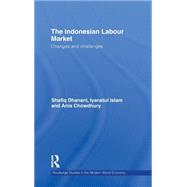- ISBN: 9780415305495 | 0415305497
- Cover: Hardcover
- Copyright: 8/14/2009
The topics of unemployment, underemployment, wage trends and patterns, and the relationship between poverty and the labour market are of interest to all policy makers, researchers, academics and journalists concerned with economic development. This book traces the evolution of the Indonesian labour market between the early 1970s and late 2000s. This entails a (a) review of macroeconomic policies and their employment impact; (b) review of unemployment and underemployment trends; (c) review of wage trends and living standards; (d) relationship between poverty, inequality and the labour market; and (e) labour market regulations, employment and the business environment. The book comes up with a number of policy-relevant findings. Macroeconomic policies, particularly inflation targeting in the 2000-2007 period, have not been conducive to employment generation. The assumption that unemployment is an appropriate indicator of labour market performance and, more importantly, that it is closely aligned with poverty, is shown to be inaccurate. Sustained real wage growth in the twenty-year period before the 1997 financial crisis is contrasted with the lack of improvement since then, a period otherwise of respectable economic growth by international standards. The predicted adverse consequences of sweeping labour market regulations in 2000-2007 on properly measured employment, unemployment and labour costs did not materialize, mainly because of low compliance. It seems that a restrictive macroeconomic framework has been more constraining for employment growth than the perceived labour market rigidity during the post-crisis period. The book concludes with an evaluation of several '¬Üreactive'¬" and '¬Üproactive'¬" labour market policies. Though these are complementary, policy makers in Indonesia have probably put too much emphasis on reactive policies such minimum wage and severance pay, and not enough on proactive policies aimed at creating an adaptable and skilled workforce.






